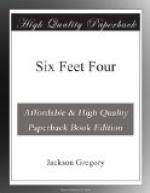THE GENTLEMAN FROM NEW MEXICO
Thornton returned rather early that night to the ranch cabin. That he came in at all, instead of remaining far out upon the range border as his men were doing, was because tomorrow he planned on riding to Dry Town where he would raise the four thousand five hundred dollars for Henry Pollard, and he wanted to make an early start.
He left his horse at the barn, passed the bunk house and was crossing the little footbridge which spanned Big Little River, going straight to his cabin upon the knoll, when he saw that while the bunk house was dark there shone a light from his cabin window. Wondering who his guest might prove to be he strode up the knoll. The cabin door was open, he could see his lamp burning upon the table, and sitting upon his chair, hands clasped behind head and cigar smoking lazily, was a man he had never seen before.
He came on, still wondering, until his tall form passed through the doorway and stood over the smoker. The man turned a little, watching him as he drew near.
“Howdy, Stranger,” Thornton said quietly.
“Mr. Thornton?” smiled the other. “You see I’ve been making myself at home.”
He rose and put out a hand, a small, hard, brown hand which the cowboy accepted carelessly and released marvelling. Its grip was as strong as his own, the muscles like rock.
The man was of medium stature, looking small beside the towering form of his host. He was dressed quietly and well, trousers still preserving the lines left by the tailor’s iron, his coat fitting closely about the compact muscular shoulders, his soft shirt white and clean. He was a sandy haired man of forty, perhaps, clean shaven, square jawed, with very bright, very clear brown eyes.
All this Thornton saw at one swift glance. He tossed his hat to the table, pulled another chair toward him, and sat down.
“Glad you made yourself at home,” he said then, “Find anything to eat?”
The stranger nodded.
“I’ve been here three hours, and I was hungry. So I raided the bunk house.”
“That’s right.” He brought out his paper and tobacco, making his cigarette slowly, his eyes alone asking the other his business.
“I want a little talk with you, Mr. Thornton. But maybe I’d better wait until you’ve eaten?”
“Had my supper an hour ago,” Thornton replied. “Made camp with the boys before I came in. Fire away, Stranger.”
“All right. First thing, my name’s Comstock.”
The keen eyes which had measured the cowboy as he came through the door were very bright upon him now. Thornton nodded. The name meant nothing to him.
“Don’t get me?” laughed Comstock. “Well, well, it’s a shock to vanity, but after all one’s fame is a poor crippled bird that doesn’t fly far.” He paused a moment, then added quietly, as though this other information might help his bird “to fly.” “My stamping ground’s New Mexico.”




